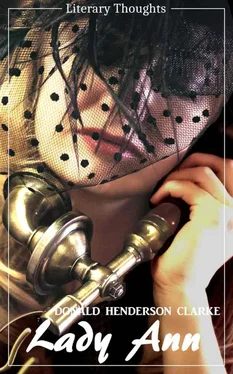Clarence had a brown-and-white water spaniel with long ears and soft brown eyes. He called the dog Tack because immediately after he had brought him home as a puppy six years before, the little fellow had swallowed a tack.
Rebecca and Clarence attributed to Tack many human qualities. They not only spelled out words in front of Tack when they didn’t wish him to know what they were talking about but they even went to the trouble of spelling many words backward. For instance, Tack loved to go to Eastham because such trips usually included a visit to Bert Cooper, the butcher.
Bert’s shop was in the line of shops and buildings in the main street of which the Pease Block occupied more than its share of space. It was cool in Bert’s, with its sawdust floor, its meat hung in rows, or displayed on the counter, its scarred chopping block, its odor of animal flesh, and its many pieces of fly paper on which flies eternally were buzzing and struggling in death throes. It was a dog’s paradise.
Bert admired Tack and fed Tack hugely. Tack tolerated Bert, who, unlike the popular idea of what a butcher should be, was a blond, partly bald, with blue eyes peering through gold-framed spectacles, a clean-shaven face, a lean and sinewy torso covered by a loose white coat, and his wrists and forearms protected by straw gauntlets. Bert generally had a rag tied around one of his fingers. He had a penchant for cutting himself every so often with one of his razor sharp knives. On account of Tack’s delight in going to Eastham, and his despondency on being left at home, Clarence and Rebecca would spell Eastham and other suggestive words backward. Clarence would say, for instance:
“Oh, Rebecca. I’m going to e-v-i-r-d to m-a-h-t-s-a-E. Would you like to o-g?”
Clarence explained this system of spelling backward as follows. He said to Ann:
“We used to spell words straight ahead. But one day after we spelled out Eastham from front to back, with Tack listening with his eyes on me, his head cocked to one side and his tongue hanging out, we got to Eastham, and found Tack there waiting for us. He knows more’n most folks, Tack does.”
Ann went to live with Clarence and Rebecca, temporarily, immediately after her father died and was buried in a plain pine coffin, as had been his wife. Both families considered that spending unnecessary money on funerals was a sinful waste. Both the Smiths and the Steeles took deaths as calmly as they took meals, and with no more sartorial preparation. They wore their everyday clothes to the funeral, not worrying about the color, and it was a source of pride in both families that ministers weren’t allowed to utter eulogies on the departed. Gramma Smith said:
“If the one that died was worthless in life he didn’t become valuable by dyin’. If the one that died lived a useful life nothin’ any minister could say would make it any more useful. And there’s nothing more terrible and embarrassing than to sit at a funeral and hear a minister spend an hour praising a man that we all know was mean to his neighbors, poison to his family, and a blot on the landscape.”
After Elihu was buried, it was learned that there was five hundred and sixty dollars in the Eastham National Bank, and twelve hundred dollars in the Eastham Institution for Savings, and a mortgage of $2,500 on the Elm Street place, which was valued at $7,500. This all was left to Ann.
Aunt Emma Mabie lived in the town of Bennington. Aunt Emma was a widow, rather careful about money. She had a pension because her late husband had been a veteran of the Civil War, and she did dressmaking. Ann didn’t especially care to live with her.
Aunt Lydia Graves, in Old Orchard, younger of the two Smith sisters, closely resembled Ann’s mother, except that she might have been adjudged even more comely had it not been for the fretful expression of her face and the slightly nagging quality in her voice.
Aunt Lydia and her short, stocky, rather silent, druggist husband, Richard, lived in a big yellow house with their three children, Richard, Jr., twenty, who was going to Amherst; Davis, sixteen, who was planning to go to Yale, and Marion, twelve, still in High School. Aunt Lydia was famous as a housekeeper. Her home was immaculate. She didn’t allow her husband or her sons to smoke in it, because the tobacco fumes stayed in the curtains and drapes and the ashes messed up the floors. In fact, she insisted on the males using the back door most of the time, and for several years while the boys were young made them remove their shoes before they entered the house.
“You wouldn’t like that, would you?” Dr. Benham asked, when he and Ann discussed the situation.
Ann’s only blood uncle, her mother’s brother, A. Howard Smith, lived in Westchester County and commuted to New York, where he had become more than merely well-to-do in the real estate business. The A. Howard Smiths, A. Howard and his wife, Elizabeth Newton Donellan Smith, had eight children, who all spoke with English accents, posted when they rode horseback, played golf, tennis and whist. Howard’s first initial concealed the name Adonijah. Dr. Benham said of this branch of the family:
“As I see it, Annie, you wouldn’t want to be an extra wheel on the cart anywhere. You’d have to be living on your uncle. He’s rich and can afford it, but maybe you can’t. Clarence and Rebecca have known you ever since you were hardly as big as a good-sized peanut. They haven’t any children of their own, and they love you. They want you. You can pay your way in affection and a little work around with them. Anyhow, it won’t do any harm to try, if you feel like it. What do you think?”
“I’d rather live with Uncle Clarence and Aunt Rebecca than anybody,” Ann said.
Clarence looked up from his rose bushes and saw Dr. Benham in his buggy, heading toward Southfield Centre. Clarence straightened up and called:
“Hey, Doc.”
Dr. Benham said:
“Whoa, Sam.”
Sam stopped, craned his neck and looked at the doctor, and then settled himself comfortably with his off-front leg bent at the knee.
The doctor wrapped the reins around his never-used whip, put his right foot, encased in a Congress Boot with elastic sides, on the right front wheel of the buggy, and removed a half-burned Connecticut cigar from the tobacco-stained area of white mustache and Vandyke, and spat into the dust. He said:
“Nice day, Clarence.”
Clarence, in collarless shirt, unpressed trousers supported by red and blue galluses, closed the gate of the white picket fence behind him and reached up a big brown hand, which the doctor shook warmly.
“A weather-breeder, though,” Clarence said. “Ain’t a cloud in the sky.”
The doctor nodded and said:
“Wouldn’t be surprised if we had a lot of rain inside of twenty-four hours.”
Sam moved his front feet forward and his hind feet backward, and released a stream of water, which spattered when it hit the dust. Clarence moved quickly away. Dr. Benham grinned.
“Catch ye, Clarence?” he asked. “Sam’s kidneys don’t seem to hold quite so well now as they did when he was younger.”
Clarence lighted one of the doctor’s cigars with a sulphur match. He took two short puffs and one long one, and spat. He said:
“I wanted to talk to you about Annie, Doc.”
“I just passed her back by Si Brockaway’s,” the doctor said. “She didn’t look very sick to me.”
Clarence grinned and knocked ashes from his cigar. Then his face became solemn and his voice lowered. He said:
“I walks into the kitchen last Saturday night and there’s Annie takin’ a bath in the washtub. You could’ve knocked me over with a feather, Doc. She ain’t a little girl any more. She’s a woman. She’s got the prettiest breasts you ever seen—plump as a partridge.”
Читать дальше












